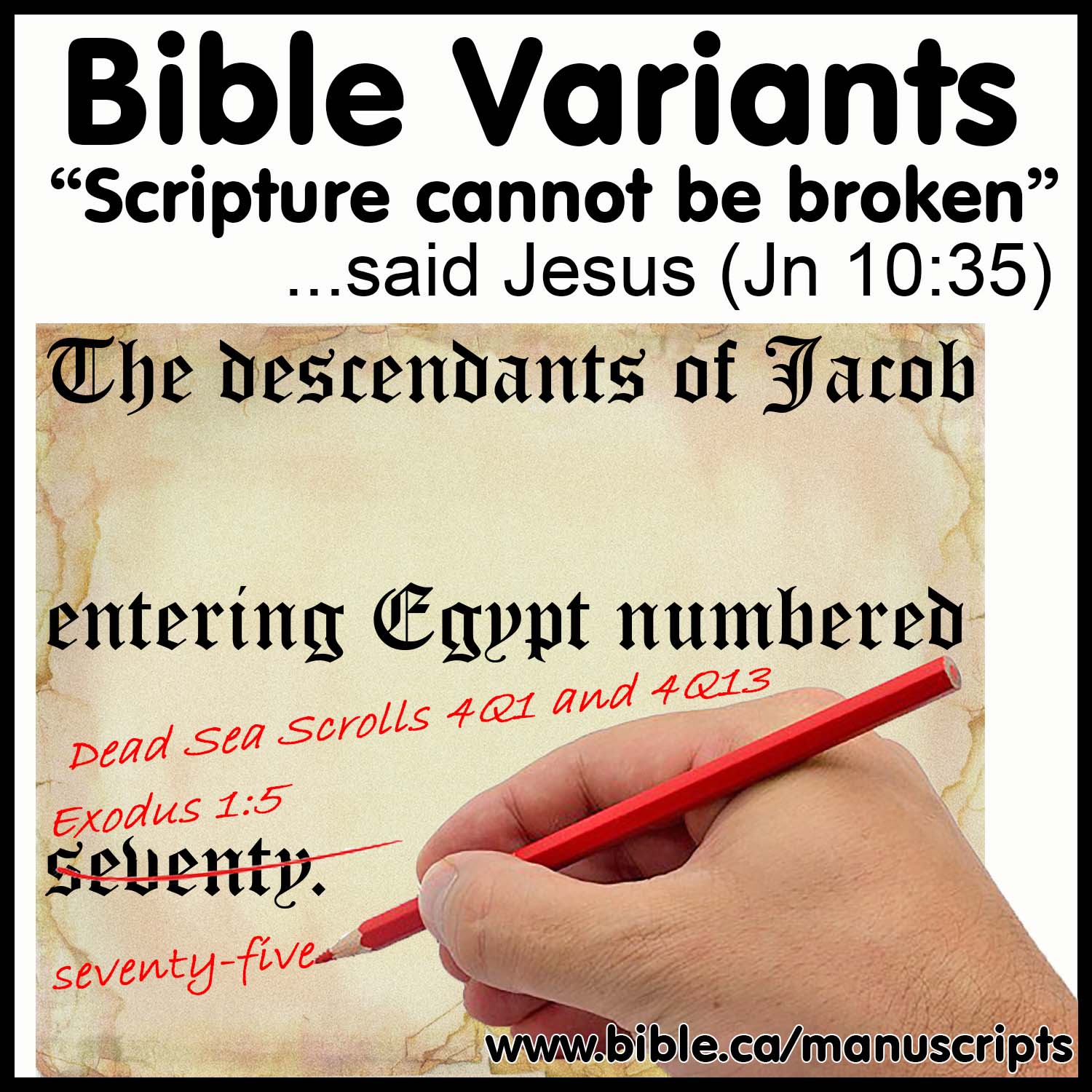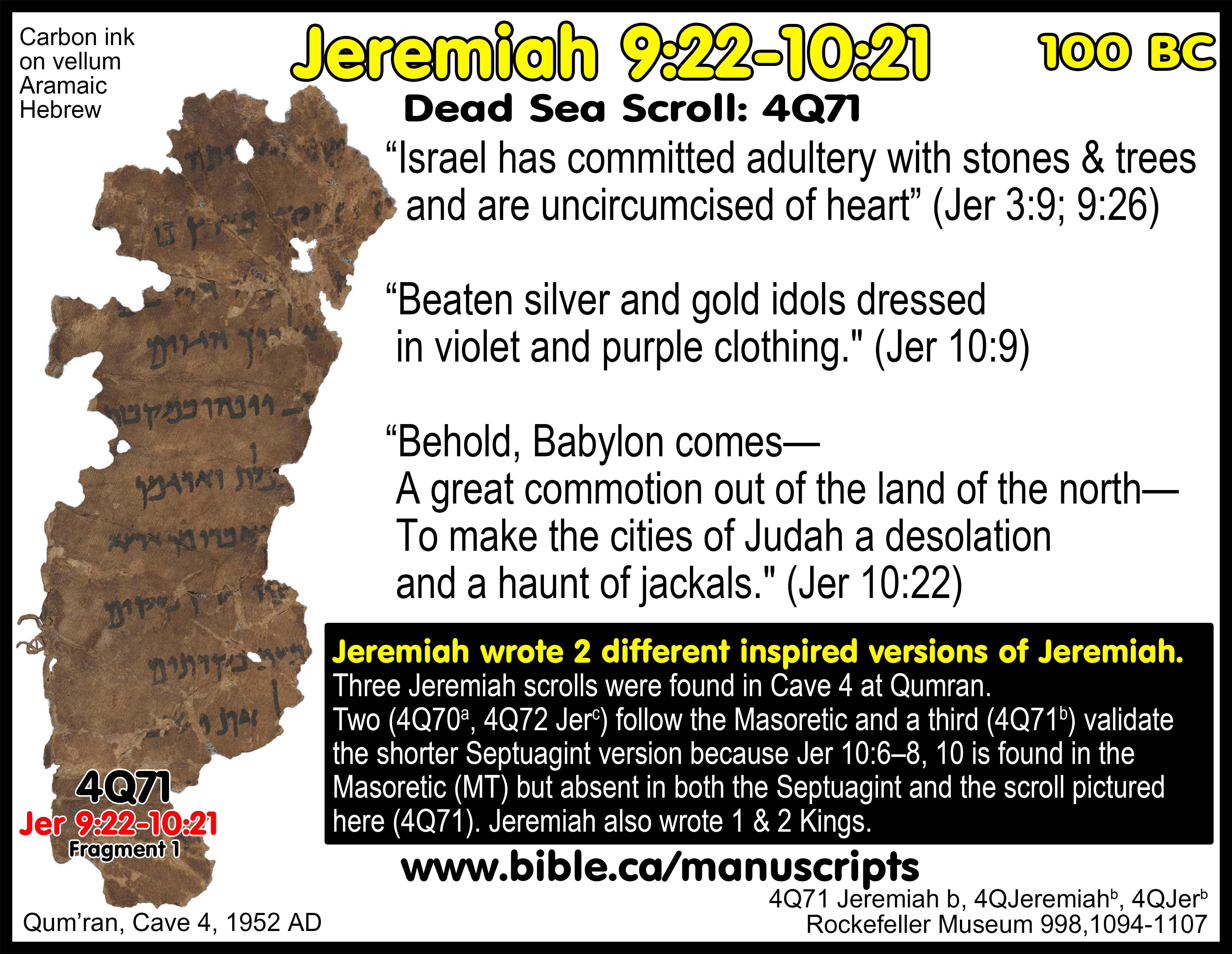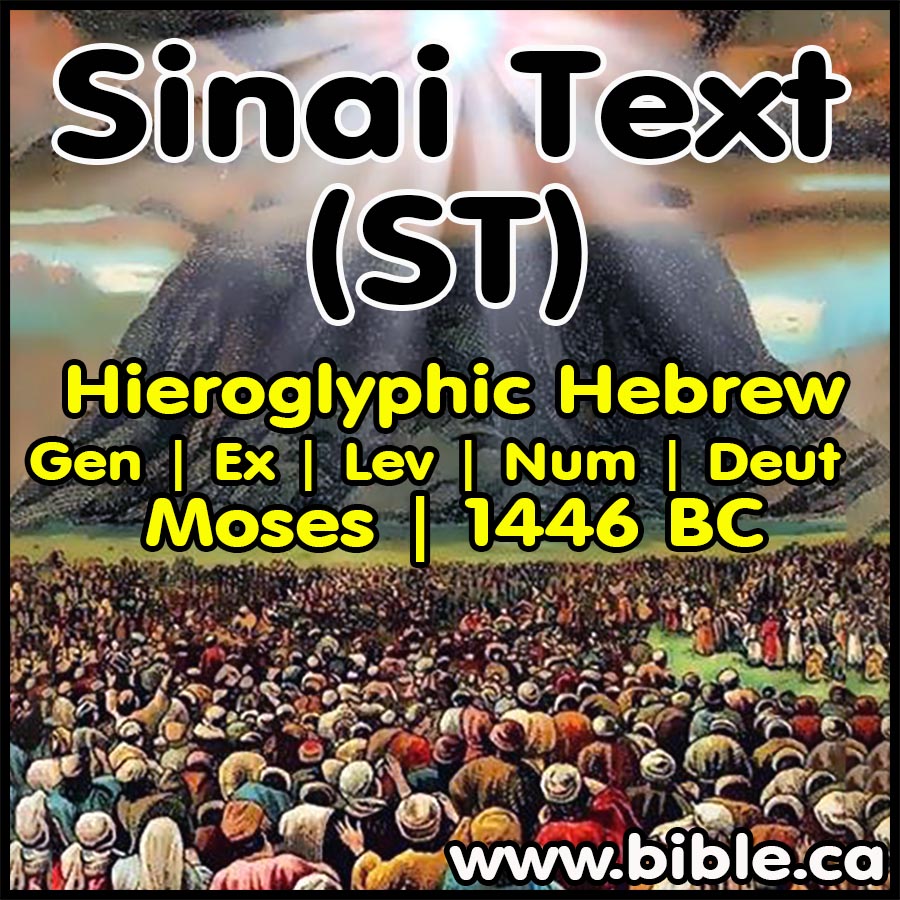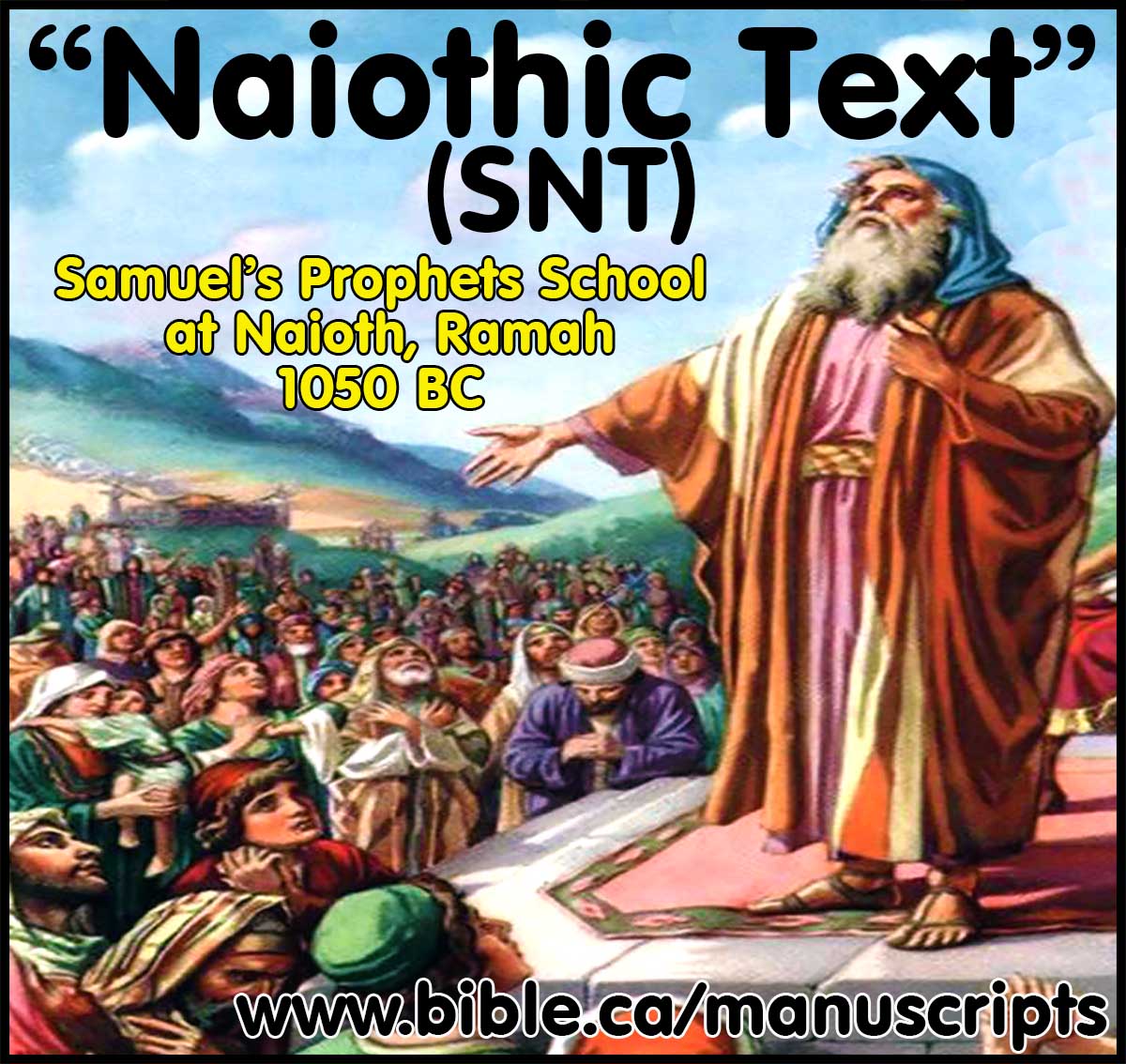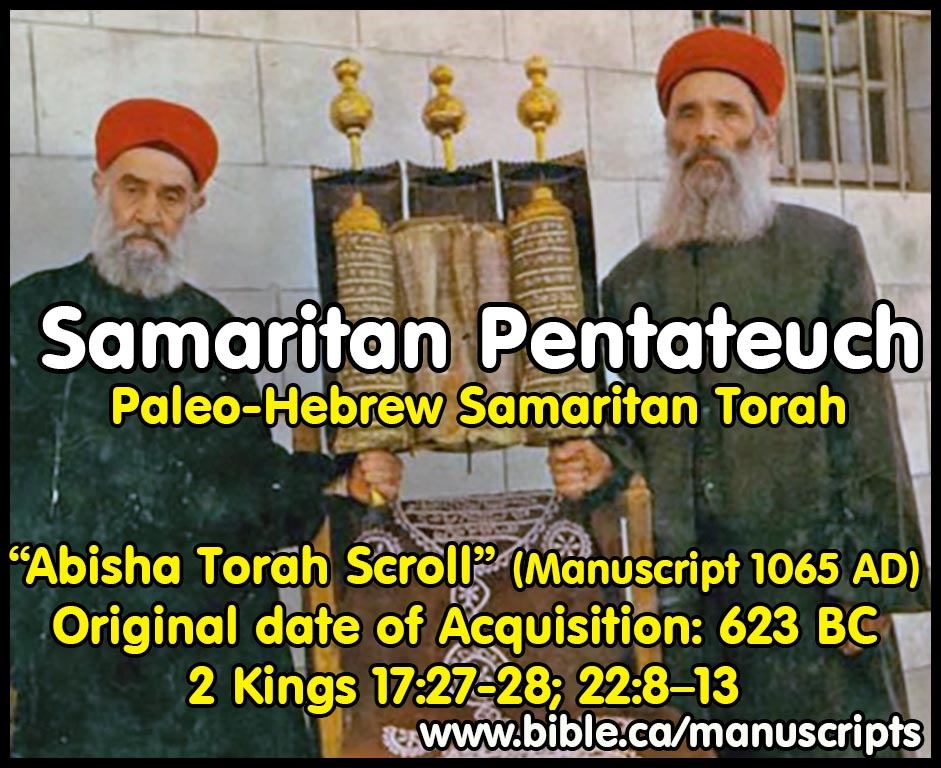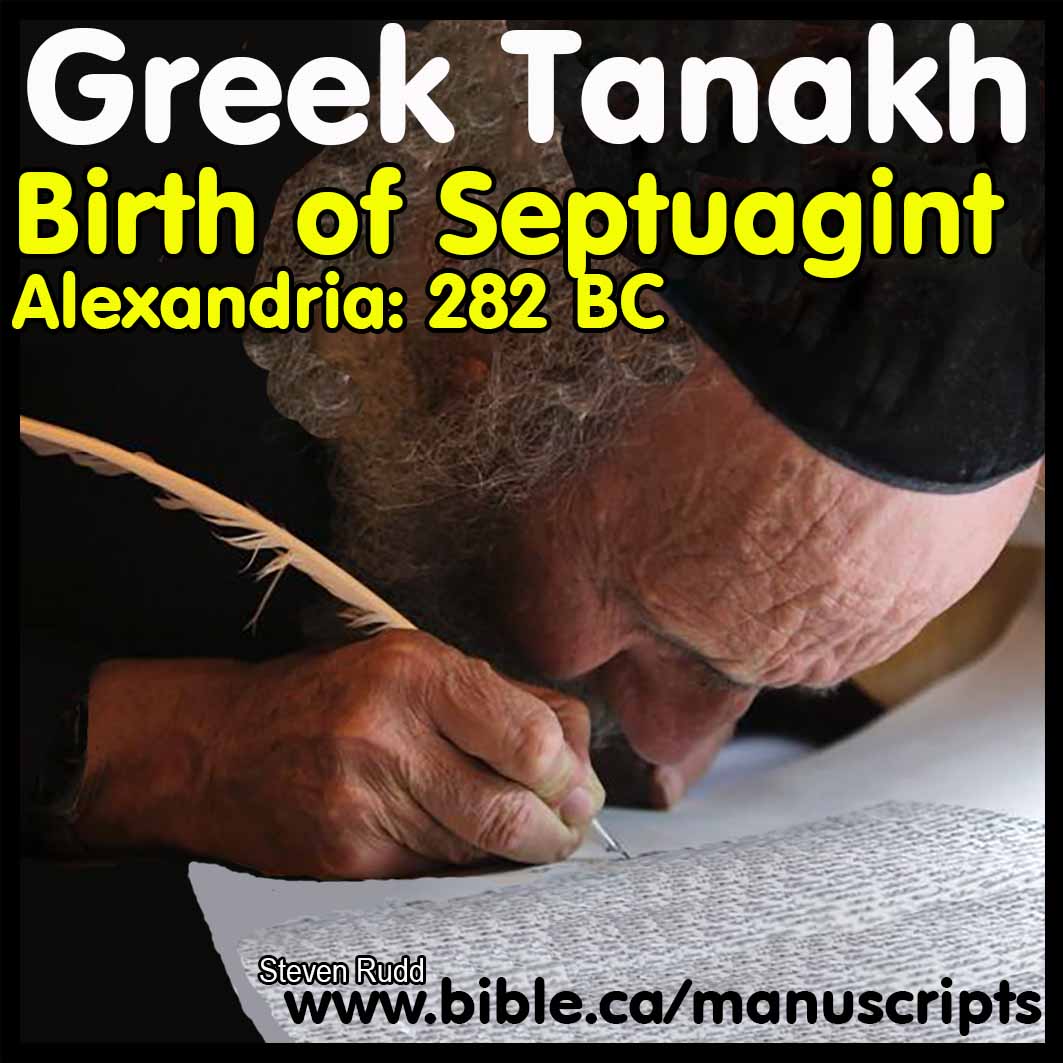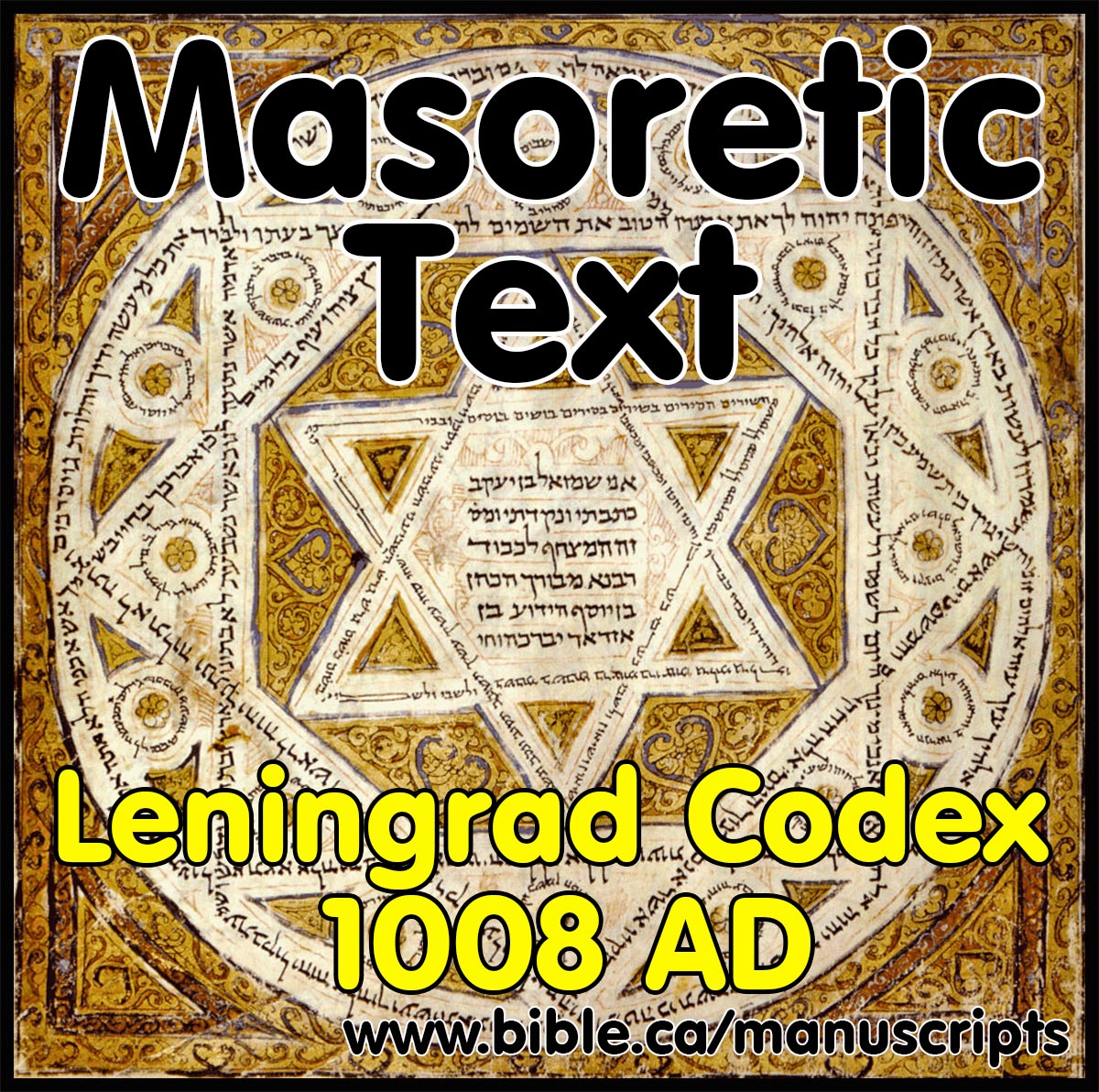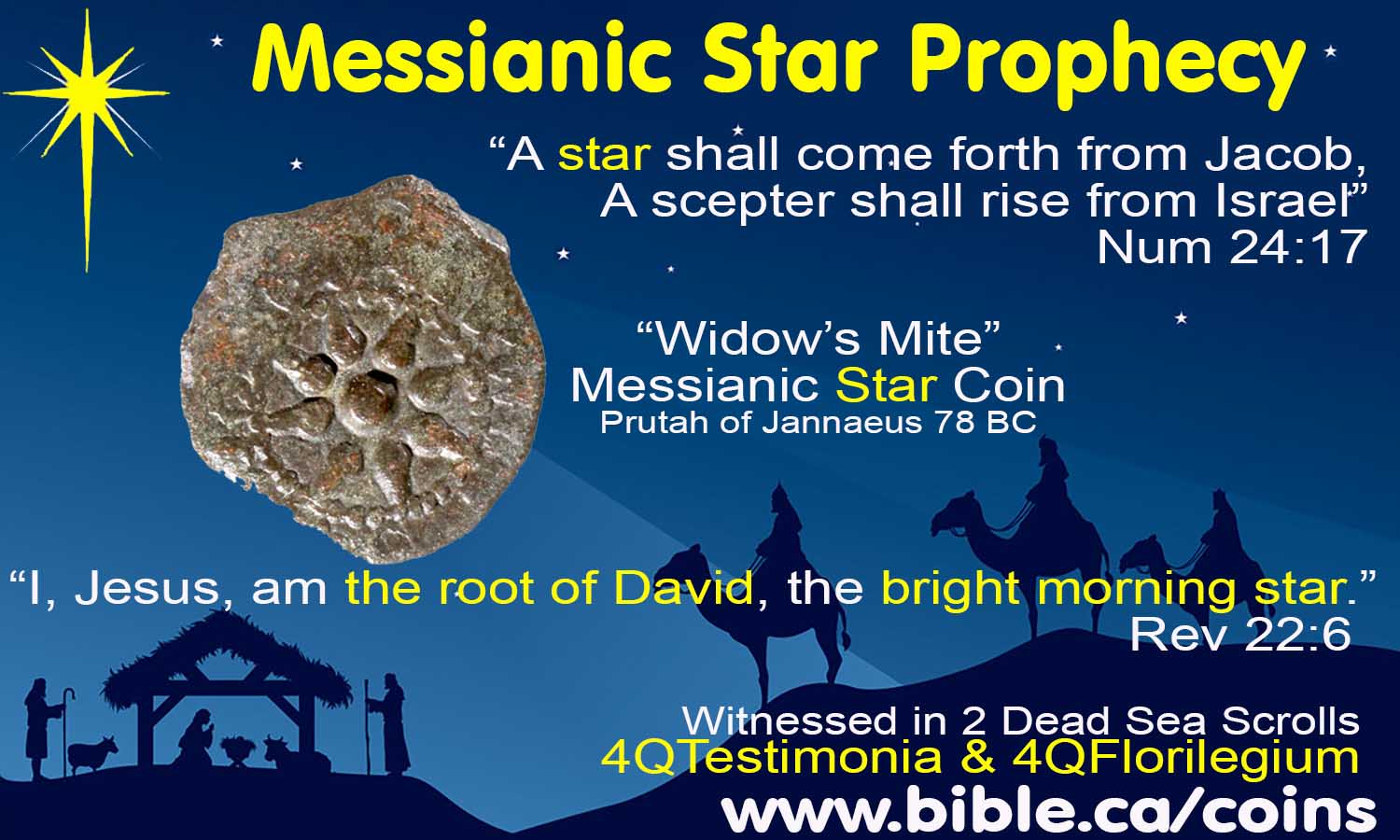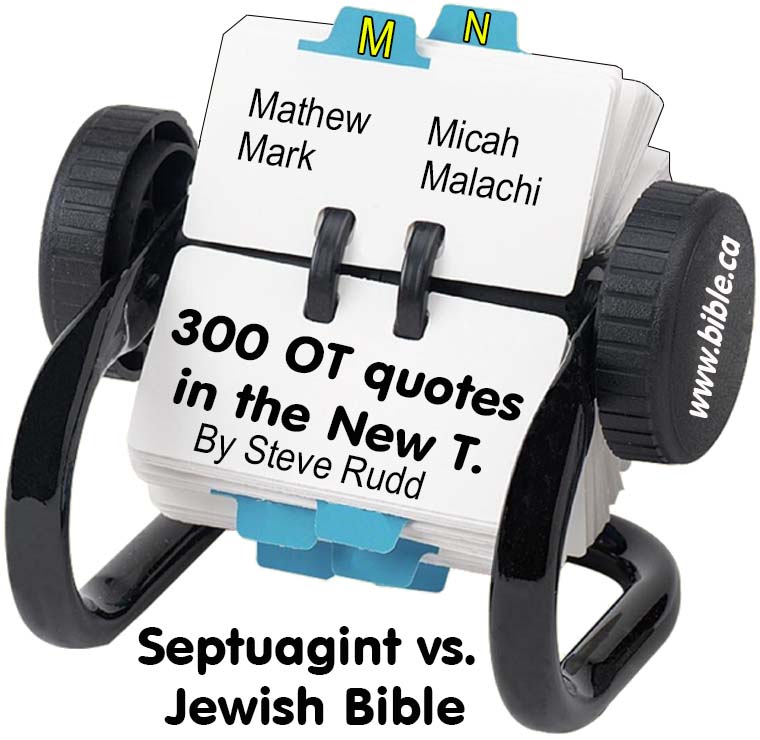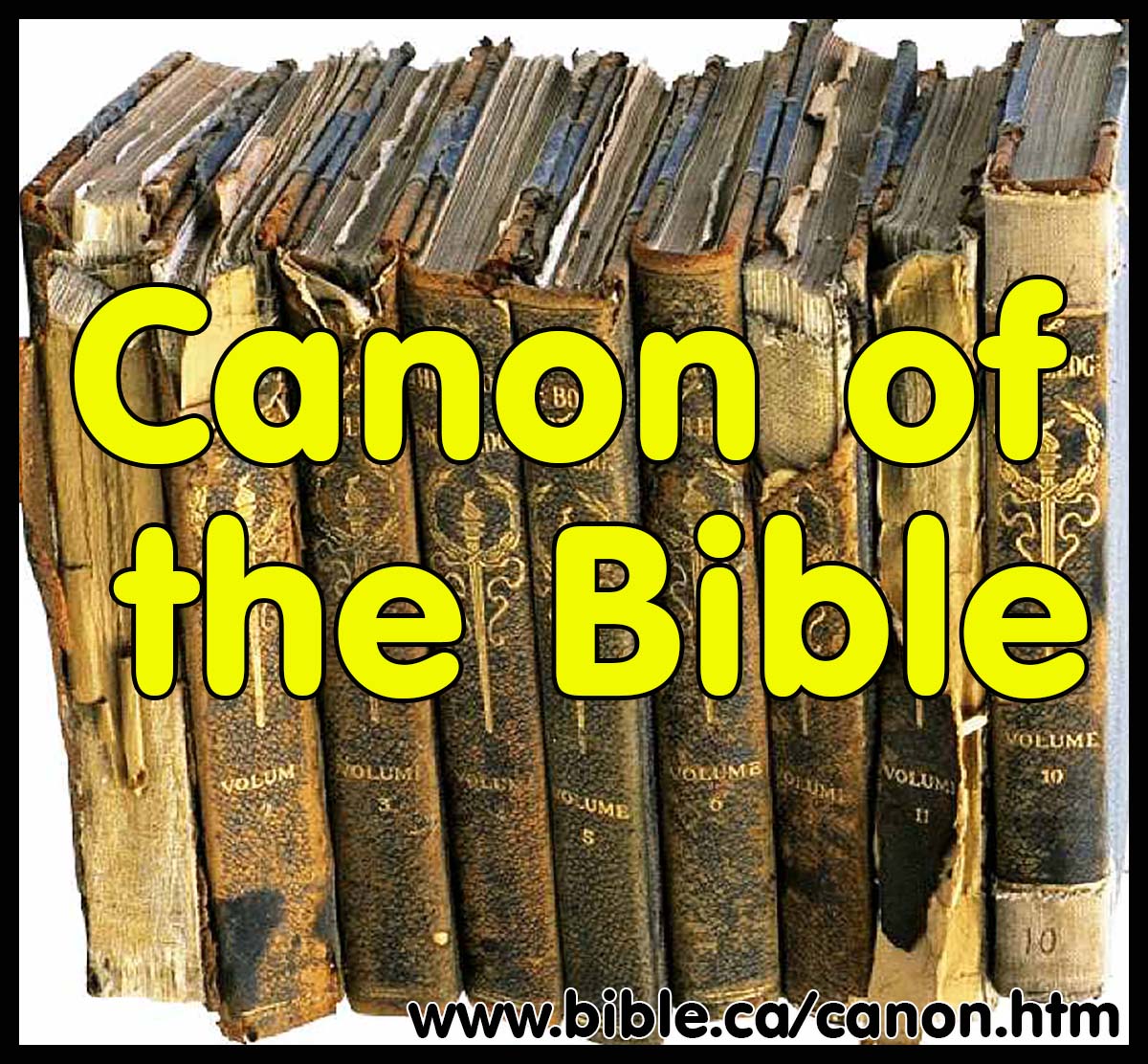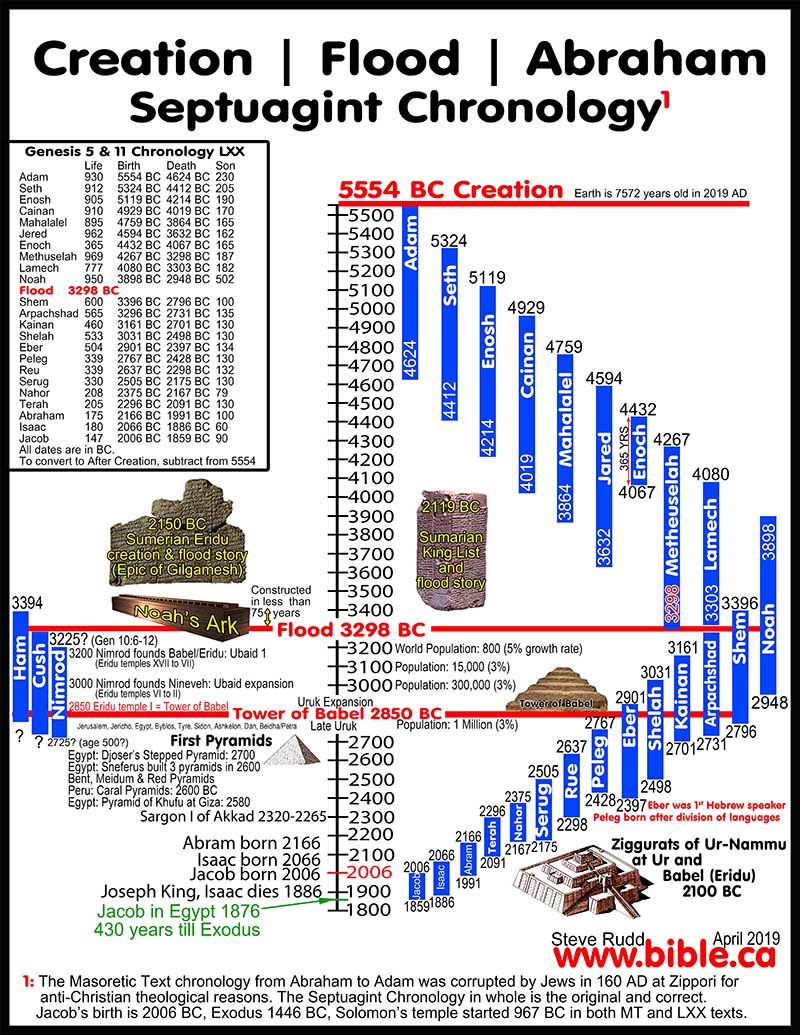|
Textual Variants in the Book of Jeremiah "Scripture cannot be broken" (Jesus, John 10:35) "My word will accomplish what I desire and succeed in the purpose for which I sent it." (Isa 55:11) Steve Rudd November 2017 |
Dead Sea Scroll 4Q71 of Jeremiah 9:22-10:21
Textual Variants in the Book of Jeremiah:
Bible textual variants analysed
Introduction:
Jeremiah probably wrote 2 different inspired versions of Jeremiah. There are 2700 more words in the Masoretic Jeremiah than there are in the Septuagint Jeremiah. The two texts have all the earmarks of being “synoptic” versions of the same material. Three Jeremiah scrolls were found in Cave 4 at Qumran. Two (4Q70a, 4Q72 Jerc) follow the Masoretic and a third (4Q71b) validate the shorter Septuagint version because Jer 10:6–8, 10 is found in the Masoretic (MT) but absent in both the Septuagint and the scroll pictured here (4Q71 b). Around 225 BC the Septuagint translators used the shorter Hebrew Jeremiah rather than the longer one. The key point is that both the longer and shorter books of Jeremiah not only co-existed, they were considered equally authoritative as inspired scripture. The three scrolls found in the cave had no signs of marginal corrections or notes where the obvious differences were in the two texts. So, it is wrong to view the longer as original and the shorter as a later revision and vise versa. The fact that both the “longer Hebrew Jeremiah” and the “shorter Hebrew Jeremiah” were in the possession of Jews then hidden in the same cave where the great Isaiah scroll was found, provided strong evidence that the prophet Jeremiah authored two different copies at different times and places. The MT and LXX versions of Jeremiah are two inspired authentic versions, the same way the Matthew, Mark, Luke and John are four different inspired accounts of the same basic story. Notable variants include the diatribe against the 9 nations in chapter 46-50 are not only in a different order, but are inserted in the middle of the LXX but at the end of the MT. The entire section on the Davidic kingdom (Jer 33:14–26) is lacking in the LXX as well as other sections: 39:4–13; 51:44b–49a; 52:27b–30. Yet other Bible books contain the exact same information. (except for Jer 52:27b-30). Further, we find EXACTLY the same type of variation in the Gospels or in Paul’s letters to the Ephesians and Colossians. Finally, the LXX and MT versions of Jeremiah do not contradict each other in any details. Jeremiah also wrote 1 & 2 Kings.
Discussion:
I. Short answer: There were two different inspired versions of the book of Jeremiah:
1. The Masoretic Jeremiah is 1/8th larger with 2700 more words than the Septuagint Jeremiah.
a. The longer and shorter versions of the book of Jeremiah may both have been authored by Jeremiah at two different times and places which means they are two authentic versions the same way the Matthew Mark Luke and John are four different inspired accounts of the same basic story.
2. Most stunning is that we have HEBREW language Dead Sea Scroll copies of both the longer and shorter versions of Jeremiah.
a. In Cave 4 at Qumran, they actually found three Hebrew scroll fragments of Jeremiah. Two of the Dead sea scroll fragments follows the “MT textual tradition” while the third fragment clearly followed the shorter “Septuagint textual tradition”.
b. It is stunning that both long (MT) and short (LXX) version scrolls were found IN THE SAME CAVE.
c. This means that the first century Jews were fully aware of the longer and shorter versions.
d. It also means we need to revise our view of the two versions. Instead of two variant copies, we need to view them both a two independent inspired copies of equal authority the same way we view the four Gospels of Matthew, Mark, Luke and John!
3. "A manuscript of Jeremiah (4QJerb) is particularly interesting because it follows the Septuagint in its two main characteristics: one-eighth shorter than the Masoretic text and a different arrangement of the text. … All these are pre-Christian but fit into the same textual tradition of the Septuagint found in the later Christian manuscripts. Thus the manuscripts from Qumran have demonstrated that a major reason for the differences between the Septuagint and the Masoretic text is that the Septuagint is based on a different Hebrew textual tradition than the Masoretic text, but one that is of equal antiquity." (The Transmission-History of the Septuagint. W. W. Combs, Bibliotheca Sacra, 146, p257, 1989 AD)
4. “Large-scale differences between the LXX and MT: Lastly, something should be said, however brief and inadequate for so large a topic, about those situations where we observe a group of real textual variants between the LXX and our Hebrew texts that belong to a pattern, so that the only explanation is that the one or the other apparently represents a different edition or recension in the history of a biblical book.” (The Text of the Old Testament, Peter J. Gentry, Journal Of The Evangelical Theological Society, 52/1, p38, March 2009)
II. Examining the orthodox view that Jeremiah write only one copy:
1. If Jeremiah wrote only one version of Jeremiah, then both the Masoretic and Septuagint both trace their history to this one autograph:
a. In this case the LXX is seen as the more authentic and the Masoretic is viewed as adding 2700 words to the original book of Jeremiah.
b. “The proto-Masoretic text had a more active history of transmission and is therefore more developed, i.e., it contains more glosses and expansions. So on the whole it is more appropriate to speak about “additions” in the MT than about “omissions” in the LXX, even though, of course, important exceptions to the general rule do exist." (ABD, Jeremiah)
2. The LXX has a shorter version of Jeremiah than the Masoretic text of 1008 AD, yet both short and long versions have been found in Hebrew copies at Qumran: "The short text of Jeremiah, as found in the Septuagint, which is about one-eighth shorter than the Masoretic text, has been found in Hebrew form among the scrolls, which also attest to the longer form. The shorter form may represent an earlier recension of Jeremiah" (Tov 1981b).
III. Dead Sea Scroll 4Q71 validates the Septuagint:
1. Here is the full Bible text of: Jeremiah 9:22-10:21 from the Septuagint witnessed in DSS 4Q71:
9:22 And ⌊the human dead⌋ will be an example upon the face of the plain of your land, like stubble behind a reaper. And there will be no one to gather it.
9:23 This is what the Lord says: “Let the wise not boast in his wisdom, and let the strong not boast in his strength, and let the wealthy not boast in his riches.
9:24 ⌊Rather⌋ let the one who boasts boast in this: that he understands and knows that I am the Lord, the one who deals in mercy and judgment and righteousness upon the earth. For my will is in this,” says the Lord.
9:25 “Look! The day is coming,” says the Lord, “and I will visit upon all the circumcised their foreskins,
9:26 upon Egypt and upon Idumea and upon Edom and upon the descendants of Ammon and upon the descendants of Moab and upon all those who shave around ⌊that which is upon his face⌋, those who dwell in the desert, because every nation is uncircumcised in flesh, and the whole house of Israel is uncircumcised in their heart.”
10:1 Hear the word of the Lord, which he spoke against you, O house of Israel!
10:2 This is what the Lord says: “Do not learn according to the ways of the nations, and do not be afraid at the signs of the sky; for they are frightened before them,
10:3 because the ordinances of the nations are worthless. A tree is cut down from the forest; it is a carpenter’s work and a molten image.
10:4 They are adorned with silver and gold. With hammers and nails they have fastened them; they will fasten them, and they will not be moved.
10:5a It is beaten silver; they will not walk.
10:9 Overlaid silver will come from Tarshish; gold of Mophaz and a goldsmith’s hand; they all are the work of artisans. They will put blue and purple on them.
10:5b They will be lifted and carried, for they will not walk. Do not be afraid of them because they will ⌊never⌋ do harm, and there is no good in them.”
10:11 This is what will you say to them, “Let gods who have not made the sky and the land be destroyed from the land and from beneath this sky.
10:12 It is the Lord who made the earth with his power, who set up the inhabited world with his wisdom. And he has stretched out the sky with his insight,
10:13 and a quantity of water was in the sky, and he brought up clouds from the end of the earth. He turned lightning into rain and brought light out from his treasuries.
10:14 Every person was foolish, without knowledge; every goldsmith was put to shame with respect to his carved images, because he cast false things; there is no breath in them.
10:15 They are worthless, works of mockery. At the time of their visitation, they will be utterly destroyed.
10:16 Such is not the portion of Jacob, because he who formed all things, he is his inheritance; the Lord is his name.”
10:17 He gathered your substance together from outside when it was residing in the choicest places.
10:18 Because this is what the Lord says: “Look! I am overthrowing those who dwell in this land with oppression so that your wound may be found.
10:19 Woe to you on account of your wound! Your wound is painful! And I said, ‘Indeed this is your wound, and it has taken hold of you.
10:20 Your tent has endured hardship. It was destroyed, and all your leather coverings were torn asunder.’ My sons and my sheep are no more. There is no longer a place for my tent, a place for my leather covering.
10:21 Because the shepherds have played the fool, and they did not seek the Lord. ⌊Therefore⌋ the whole pasture did not perceive, and they were scattered abroad.
2. Hebrew Dead Sea Scroll 4Q71 follows the content and verse order of the Septuagint:
a. Verse 5 in both the LXX and 4Q71 is split in two and have v9 sandwiched between the two parts: verse order: 5a, 9. 5b.
b. Verses 6,7,8 and 10 are found in the MT but are missing in both the Septuagint and 4Q71.
c. This is quite peculiar and proves that the LXX was indeed translated PRECISELY from a recognized and authoritative Hebrew manuscript of Jeremiah.
d. Here is how the text of Jeremiah 10:5-11 read in the MT and the LXX/4Q71:
|
The Dead Sea Scrolls validate the Septuagint manuscript of Jeremiah |
|
|
Greek Septuagint (LXX) and Hebrew Dead Sea Scroll 4Q71 |
Hebrew Masoretic Text (MT) |
|
Verse order in LXX & 4Q71 Jeremiah 10:5a, 9, 5b, 11 |
Verse order in MT Jeremiah 10:5, 6, 7, 8, 9, 10, 11 |
|
V5a "It is beaten silver; they will not walk. (v5 is split in two with half before v9 and half after v9) |
V5: “Like a scarecrow in a cucumber field are they, And they cannot speak. They must be carried, Because they cannot walk! Do not fear them, For they can do no harm, Nor can they do any good.” |
|
Jeremiah 10:6-8 missing in Septuagint and Dead Sea scroll 4Q71 |
V6-8: “There is none like You, O Lord; You are great, and great is Your name in might. Who would not fear You, O King of the nations? Indeed it is Your due! For among all the wise men of the nations And in all their kingdoms, There is none like You. But they are altogether stupid and foolish In their discipline of delusion—their idol is wood!” |
|
V9: Overlaid silver will come from Tarshish; gold of Mophaz and a goldsmith’s hand; they all are the work of artisans. They will put blue and purple on them. |
V9: “Beaten silver is brought from Tarshish, And gold from Uphaz, The work of a craftsman and of the hands of a goldsmith; Violet and purple are their clothing; They are all the work of skilled men.” |
|
5b: (v5 is split in two with half before v9 and half after v9) They will be lifted and carried, for they will not walk. Do not be afraid of them because they will never do harm, and there is no good in them.” |
V5b I the LXX column to the right is not missing in the MT, it is in v5 above in this column. The LXX & DSS have a different order of the verses. |
|
Jeremiah 10:10 is missing in Septuagint and Dead Sea scroll 4Q71 |
V10: “But the Lord is the true God; He is the living God and the everlasting King. At His wrath the earth quakes, And the nations cannot endure His indignation. |
|
This is what will you say to them, “Let gods who have not made the sky and the land be destroyed from the land and from beneath this sky. |
V11: Thus you shall say to them, “The gods that did not make the heavens and the earth will perish from the earth and from under the heavens.” |
3. Key bible verses from the book of Jeremiah on the Idolatry that caused God to send Nebuchadnezzar to destroy the temple of Solomon:
a. "Israel has committed adultery with stones and trees." (Jeremiah 3:9)
b. "All the house of Israel are uncircumcised of heart.”" (Jeremiah 9:26)
c. "But they are altogether stupid and foolish in their delusion- their idol is wood! Beaten silver and gold dressed in violet and purple clothing." (Jeremiah 10:8–10)
d. "Behold, Babylon comes— A great commotion out of the land of the north— To make the cities of Judah A desolation, a haunt of jackals." (Jeremiah 10:22)
V. Variant sections of text in the LXX that are lacking in the :
1. There are entire chunks of text contained in the Hebrew Masoretic (MT) that are entirely lacking in the Greek Septuagint (LXX)
a. Text in the MT but lacking in the LXX: Jer 33:14–26; 39:4–13; 51:44b–49a; 52:27b–30
b. We find exactly the same phenomena in the books of Kings and Chronicles and the New Testament gospels.
2. There is nothing in all the missing text in the LXX that is not found elsewhere in the word of God outside Jeremiah in other Bible books.
a. Jeremiah 33:14–26 contains the same Messianic prophecy information about temple sacrifices and Levitical priests in Isaiah 66:20–24. Of course, Christians understand this is spiritualized in the church where every Christian is a priest who offers spiritual sacrifices of God.
b. Jeremiah 39:4–13: The same story of Zedekiah fleeing, getting captured and killed, and the release of Jeremiah is found in 2 Kings 25. Not surprising, given Jeremiah wrote both the books of Jeremiah AND first and second Kings.
c. Jeremiah 51:44b–49a has the same call to “come out from among them” as Is 48:20; Jer 50:8, 28; 51:6 and the book of Revelation 18:4
d. Jeremiah 52:27b–30 brand new information but just adds to what we already know about the many deportations of Judeans to Babylon.
|
Text absent from the Septuagint is found in other Bible books |
||
|
Text in Masoretic |
Lacking in Septuagint |
Other Bible books |
|
Jeremiah 33:14–26 |
- |
in Isaiah 66:20–24 |
|
Jeremiah 39:4–13 |
- |
2 Kings 25 |
|
Jeremiah 51:44b–49a |
- |
Is 48:20; Jer 50:8, 28; 51:6; Revelation 18:4 |
|
Jeremiah 52:27b–30 |
- |
- |
3. Here is the full text of the variant sections in the MT but lacking in the LXX:
a. "‘Behold, days are coming,’ declares the Lord, ‘when I will fulfill the good word which I have spoken concerning the house of Israel and the house of Judah. ‘In those days and at that time I will cause a righteous Branch of David to spring forth; and He shall execute justice and righteousness on the earth. ‘In those days Judah will be saved and Jerusalem will dwell in safety; and this is the name by which she will be called: the Lord is our righteousness.’ “For thus says the Lord, ‘David shall never lack a man to sit on the throne of the house of Israel; and the Levitical priests shall never lack a man before Me to offer burnt offerings, to burn grain offerings and to prepare sacrifices continually. [Same as Messianic prophecy in Isaiah 66:20–24]’ ” The word of the Lord came to Jeremiah, saying, “Thus says the Lord, ‘If you can break My covenant for the day and My covenant for the night, so that day and night will not be at their appointed time, then My covenant may also be broken with David My servant so that he will not have a son to reign on his throne, and with the Levitical priests, My ministers. ‘As the host of heaven cannot be counted and the sand of the sea cannot be measured, so I will multiply the descendants of David My servant and the Levites who minister to Me.’ ” And the word of the Lord came to Jeremiah, saying, “Have you not observed what this people have spoken, saying, ‘The two families which the Lord chose, He has rejected them’? Thus they despise My people, no longer are they as a nation in their sight. “Thus says the Lord, ‘If My covenant for day and night stand not, and the fixed patterns of heaven and earth I have not established, then I would reject the descendants of Jacob and David My servant, not taking from his descendants rulers over the descendants of Abraham, Isaac and Jacob. But I will restore their fortunes and will have mercy on them.’ ”" (Jeremiah 33:14–26)
b. "When Zedekiah the king of Judah and all the men of war saw them, they fled and went out of the city at night by way of the king’s garden through the gate between the two walls; and he went out toward the Arabah. But the army of the Chaldeans pursued them and overtook Zedekiah in the plains of Jericho; and they seized him and brought him up to Nebuchadnezzar king of Babylon at Riblah in the land of Hamath, and he passed sentence on him. Then the king of Babylon slew the sons of Zedekiah before his eyes at Riblah; the king of Babylon also slew all the nobles of Judah. He then blinded Zedekiah’s eyes and bound him in fetters of bronze to bring him to Babylon. The Chaldeans also burned with fire the king’s palace and the houses of the people, and they broke down the walls of Jerusalem. As for the rest of the people who were left in the city, the deserters who had gone over to him and the rest of the people who remained, Nebuzaradan the captain of the bodyguard carried them into exile in Babylon. But some of the poorest people who had nothing, Nebuzaradan the captain of the bodyguard left behind in the land of Judah, and gave them vineyards and fields at that time. Now Nebuchadnezzar king of Babylon gave orders about Jeremiah through Nebuzaradan the captain of the bodyguard, saying, “Take him and look after him, and do nothing harmful to him, but rather deal with him just as he tells you.” So Nebuzaradan the captain of the bodyguard sent word, along with Nebushazban the Rab-saris, and Nergal-sar-ezer the Rab-mag, and all the leading officers of the king of Babylon. [same as 2 Kings 25] (Jeremiah 39:4–13)
c. "“Come forth from her midst, My people, And each of you save yourselves From the fierce anger of the Lord. [same as Is 48:20; Jer 50:8, 28; 51:6] “Now so that your heart does not grow faint, And you are not afraid at the report that will be heard in the land— For the report will come one year, And after that another report in another year, And violence will be in the land With ruler against ruler— Therefore behold, days are coming When I will punish the idols of Babylon; And her whole land will be put to shame And all her slain will fall in her midst. “Then heaven and earth and all that is in them Will shout for joy over Babylon, For the destroyers will come to her from the north,” Declares the Lord." (Jeremiah 51:44b–49a)
d. "These are the people whom Nebuchadnezzar carried away into exile: in the seventh year 3,023 Jews; in the eighteenth year of Nebuchadnezzar 832 persons from Jerusalem; in the twenty-third year of Nebuchadnezzar, Nebuzaradan the captain of the guard carried into exile 745 Jewish people; there were 4,600 persons in all." (Jeremiah 52:27b–30)
V. Archeological and literary details about Jeremiah:
1. Dead Sea Scrolls and the manuscript of Jeremiah: 4QJerb
a. “The Qumran evidence for the Hebrew text of Jeremiah is relatively slender, comprising four manuscripts. Three of these (2Q Jer, 4Q Jera, 4Q Jerc) represent the standard Hebrew textual tradition that has survived in the MT. A fourth fragment (4Q Jerb), however, is of particular interest in that it appears to contain a portion of the text that constituted the Vorlage of LXX, or the “Old Greek” text of Jeremiah. 4Q Jerb is a fair-sized fragment, containing Jer 9:22–10:18, although only the left hand portion of the column of text has survived, so that the beginnings of the lines must be reconstructed. In several ways, 4Q Jerb corresponds to the LXX version of 9:22–10:18, rather than to the MT version: (i) 10:6–8, 10 (MT) are omitted, as they are in LXX; (ii) v 5 (MT) follows v 9, as it does in the LXX; (iii) word order in 10:4 parallels that of the LXX, rather than of the MT. In summary, 4Q Jerb would seem to provide a small piece of evidence for the Hebrew recension lying behind the LXX text of Jeremiah, and it is of interest to note that samples of both recensions, that is the textual traditions represented in both the MT and the LXX, were found in a single cave (4Q), indicating a continuing state of fluidity with respect to the text of the Book of Jeremiah.” (Word Biblical Commentary, P. C. Craigie, Jeremiah, p xlii, 1998 AD)
b. “A manuscript of Jeremiah (4QJerb) is particularly interesting because it follows the Septuagint in its two main characteristics: one-eighth shorter than the Masoretic text and a different arrangement of the text.” (The Transmission-History of the Septuagint. W. W. Combs, Bibliotheca Sacra, 146, p257, 1989 AD)
2. The Origin of the Proto-Septuagintal and Proto-Masoretic Texts; The Nature of the Proto-Septuagintal Text:
a. “The presence at Qumran of a Hebrew text representing the text tradition of G [G=Lxx] (4QJerb) dating from the Hasmonean period alongside a Proto-Masoretic text from the beginning of the second century b.c.e. (4QJera) immediately raises the question of the origin of these two text types. It is hardly possible to imagine two radically different text types evolving side by side in Palestine: their existence would rapidly have produced a mixed text. Since the examplar of the Proto-Masoretic text at Qumran (4QJera) is to be dated very near the time of the translation of the Old Greek, one must conclude that the Proto-Septuagintal text must have been preserved in isolation. The natural conclusion is that the shorter text had been preserved in Egypt. On the other hand the longer Proto-Masoretic text exhibits harmonistic tendencies also found in the Samaritan Pentateuch (obviously a Palestinian text type—on this matter see sec. 8): the Proto-Masoretic text thus became the standard one in Palestine. The two text traditions branched off from each other during the period when expansions were being made in the text: one pair of doublets appears in both texts (10:12–16* = 51:15–19*) while others are found only in M (see below). It is worth noting that although the Proto-Masoretic text is the longer text, particularly in the prose, there are evidences of recensional activity in the Proto-Septuagintal text as well. A. R. Diamond has recently pointed out that in Jrm’s confessions G minimizes the specificities of some passages, so that the material becomes more a generic lament. Thus in a sequence in 15:15–16*, where M reads, “Know how I have borne disgrace on your account; your words were found, and I ate them,” G reads, “Know that I have borne disgrace on your account from those who set aside your words; consume them.” Again in 15:18* the text in M reads, “Why has my pain become endless, my wound incurable, refusing to be healed? You really are becoming for me, as it were, a deception, untrustworthy waters!” In G, however, the last half continues to describe the wound, not God: “Why do those who grieve me prevail against me? My wound is severe, whence shall I be healed? It has indeed become to me like false water, not having faithfulness.”33 If the Proto-Septuagintal text evolved in Egypt, it is striking that an examplar found its way to Qumran. One wonders, did the Qumran community derive from the authorities in Jerusalem an interest in a variety of text traditions of Scripture, or was this an interest confined to Qumran itself? One can at least conclude that manuscripts were carried long distances and that the Qumran community was hospitable to variant text traditions, at least for Jer." (Hermeneia, Jeremiah, p6, 1989 AD)
3. Short and long versions of Jeremiah: MT and LXX:
a. “The book has survived in two main versions from antiquity: the Hebrew Masoretic Text (MT) and the older Greek Septuagint (LXX). The two differ widely, more so than with any other Old Testament book. The Greek is one-eighth shorter than the Hebrew and after 25:13a the order of materials differs. Because of the uncommonly large number of divergencies there has been considerable discussion over the years with regard to the transmission of the text, the basis of the Greek translation, and the question of which text is earlier and/or superior. This discussion has only intensified with the discovery of three partial Jeremiah manuscripts among the Dead Sea Scrolls of Cave 4. One is a short text and two are long. The long 4Q Jera is dated ca. 200 b.c. and is proto-Masoretic. The short 4Q Jerb is dated in the 2d century b.c. and closely resembles the LXX, which, along with its Vorlage cannot be much older. (The LXX translation of the Prophets was done sometime between 250 and 150 b.c.; see SEPTUAGINT). The other long 4Q Jerc is no earlier than the 1st century b.c. (Cross). The existence of a short Hebrew text of Jeremiah in the 2d century b.c. has given rise to the theory—now widely held—that the LXX translator or translators did not produce an abridgement but rather translated a Hebrew text of comparable length localized in Egypt where the translation was made. This Hebrew text is believed to have survived in comparative isolation from the proto-Masoretic text which originated in Babylon (Cross 1964). The high incidence of haplography in the Egyptian text results from an inactive history of transmission during which time omissions went undetected and uncorrected (Janzen 1967: 446–47). The proto-Masoretic text had a more active history of transmission and is therefore more developed, i.e., it contains more glosses and expansions. So on the whole it is more appropriate to speak about “additions” in the MT than about “omissions” in the LXX, even though, of course, important exceptions to the general rule do exist." (ABD, Jeremiah)
4. Along with Job and Daniel, the book of Jeremiah exhibits striking divergences between the Masoretic Text and the lxx version. (TOTC, R. K. Harrison, Jeremiah, p46, 1973 AD)
5. “On the other hand the MT tradition is preserved on other fragments which seem to agree with MT as against LXX.6 It seems clear that the group of fragments denoted as 4QJerb which comprise portions of 9:22–10:18; 43:3–9; 50:4–6 give clear, if not complete support to the view that the background to LXX was a form of the Jeremiah shorter Hebrew text; or, to state the case the other way round, the Greek text is clearly, if not perfectly, a witness to a short Hebrew text of the book of Jeremiah.7 Thus the textual tradition of Jeremiah is at least twofold. It now seems clear from Qumran that both the longer and shorter forms of the text were available in the Qumran community and that the MT and LXX of Jeremiah are based on different recensions of the Hebrew text of the book.” (NICOT, Jeremiah, p 119, 1980 AD)
6. “One of the striking features about the text of Jeremiah is that the Hebrew Masoretic Text (MT) is considerably longer than the Greek text (LXX). In fact, statistically the Greek text is one-eighth shorter than the Hebrew text, since there are some 2700 words which are present in the MT but absent in LXX. The Greek omissions comprise single words, phrases, sentences, and some entire passages, of which the longest is about 180 words and some others are quite sizable, e.g., 33:14–26; 39:4–13; 51:44b–49a; 52:27b–30. In addition to these textual variants there is a major difference in the order of the oracles against the nations, which in the MT are at the end of the book but in LXX are in the middle, inserted after 25:13 (v, 14 is lacking in LXX). Moreover, the order is different. MT has the order, Egypt (46:2–28), Philistia (47:1–7), Moab (ch. 48), Ammon (49:16), Edom (49:7–22), Damascus (49:23–27), Kedar (49:28–33), Elam (49:34–39), Babylon (chs. 50, 51). LXX has the order Elam, Egypt, Babylon, Philistia, Edom, Ammon, Kedar, Damascus, Moab.” (NICOT, Jeremiah, p 117, 1980 AD)
7. “The book has survived in two main versions from antiquity: the Hebrew Masoretic Text (MT) and the Greek Septuagint (LXX). These vary widely, more so than in any other Old Testament book.” (AYBC, J. R. Lundbom, Jeremiah, p 57, 2008)
8. “Some MT pluses are single words or phrases providing embellishment, but which do not materially affect the sense, e.g., “thus said Yahweh” or “oracle of Yahweh”; “the prophet” attached to “Jeremiah” or “Hananiah” (28:5, 6, 10 [LXX 35:5, 6, 10]); “eunuch” attached to “Ebed-melech” (38:7); “Nebuchadrezzar” (alt. “Nebuchadnezzar”), where the LXX either does not mention the king or has only “king of Babylon” (21:2, 7; 22:25; 27:8, 20 [LXX 34:8, 20]); “Yahweh, the God of Israel” or “Yahweh of hosts,” where the LXX translates only “Yahweh.” But there are exceptions, e.g., the LXX in some places does name Nebuchadrezzar / Nebuchadnezzar (24:1 and 34:6 [MT 27:6]). Other pluses consist of superscriptions, e.g., “And the word of Yahweh came to me (saying): ‘Go and proclaim in the hearing of Jerusalem:’ ” (2:1–2a); “The word that came to Jeremiah from Yahweh (saying): ‘Stand at the gate of Yahweh’s house and proclaim there this word, and say:’ ” (7:1–2a); see also 16:1; 27:1 (where “Jehoiakim” is mistakenly substituted for “Zedekiah”); and 47:1 (Tov 1985: 218–19). (AYBC, J. R. Lundbom, Jeremiah, p 58, 2008)
Conclusion:
It seems clear that Jeremiah wrote two inspired versions of the book of Jeremiah since both the longer and shorter versions were found in the same cave at Quran. This proves that two different versions of the book of Jeremiah not only co-existed, they were considered equally authoritative as inspired scripture. Like the synoptic gospels of Matthew, Mark and Luke, the two versions of Jeremiah contain nothing contradictory. In fact, the two versions of Jeremiah simply rearrange the order of information for the most part. While there are chunks of text contained in the MT that are entirely lacking in the LXX
(Jer 33:14–26; 39:4–13; 51:44b–49a; 52:27b–30) other Bible books contain the exact same information. (except for Jer 52:27b-30). We find exactly the same phenomena in the books of Kings and Chronicles.
In the final analysis, we can be certain that we possess the word of God!
This is what Jesus meant, when He said: "Scripture cannot be broken" (Jesus, John 10:35)
"My word will accomplish what I desire and succeed in the purpose for which I sent it." (Isa 55:11)
|
The Septuagint LXX “Scripture Cannot Be Broken” |
|||||
|
Start Here: Master Introduction and Index |
|||||
|
Six Bible Manuscripts |
|||||
|
1446 BC Sinai Text (ST) |
1050 BC Samuel’s Text (SNT) |
623 BC Samaritan (SP) |
458 BC Ezra’s Text (XIV) |
282 BC Septuagint (LXX) |
160 AD Masoretic (MT) |
|
Research Tools |
|||||
|
Steve Rudd, November 2017 AD: Contact the author for comments, input or corrections |
|||||
By Steve Rudd: November 2017: Contact the author for comments, input or corrections.
Go to: Main Bible Manuscripts Page
